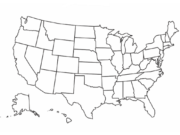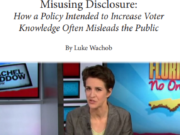In this article, CCP Chairman Bradley A. Smith examines several practical and constitutional issues with campaign finance disclosure. In particular, Smith scrutinizes those policies being advocated by proponents of greater regulation of political speech in response to the Supreme Court’s 2010 decision in Citizens United v. Federal Election Commission.
A primary political reaction to Citizens United has been a demand for new laws and regulations governing the disclosure of political spending and contributions. Proposed new regulations, however, have tended to overlook some serious practical problems of increased compulsory disclosure. The effort to mandate increased disclosure is also, at least in substantial measure, based on illegitimate intent and an incorrect understanding of the extent of compulsory disclosure laws both before and after Citizens United. According to the article, the new disclosure sought by advocates of greater campaign finance regulation threatens hard won constitutional rights that ought not be surrendered too easily. Ultimately, Smith concludes that compulsory disclosure cannot bear the weight some now seek to place upon it, and in trying, endangers other important political and social values.














